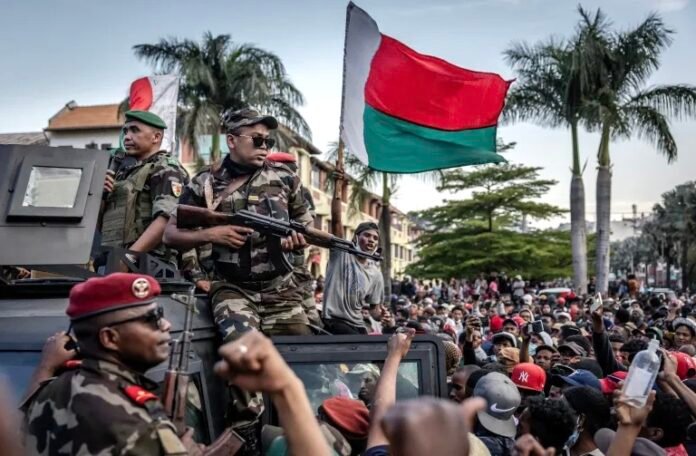Madagascar’s presidency warned on Sunday of an ongoing attempt to seize power by force, as growing numbers of soldiers joined a youth-led protest movement that has gripped the island nation for more than two weeks.
Troops from the elite CAPSAT unit—key players in President Andry Rajoelina’s 2009 rise to power—called on fellow soldiers on Saturday to defy government orders and support the protesters. The demonstrations, which began on September 25 over water and electricity shortages, have evolved into a broader demand for Rajoelina’s resignation, an apology for violence against demonstrators, and the dissolution of the Senate and electoral commission.
CAPSAT officers announced on Sunday that they had assumed command of the country’s security operations and appointed General Demosthene Pikulas as head of the army. They declared that all military branches would now operate under their coordination from their base outside the capital, Antananarivo.
A unit of the paramilitary gendarmerie, previously aligned with the police in controlling the protests, also broke ranks with the government. “All use of force and any improper behaviour towards our fellow citizens are prohibited,” the National Gendarmerie’s Intervention Forces said in a televised statement, emphasizing that their duty was to protect the public, not serve the interests of a few individuals. The unit confirmed it was cooperating with CAPSAT.
The Defence Ministry and military general staff declined to comment. A Reuters correspondent reported that at least three people were injured when shots were fired near the CAPSAT barracks on Sunday, although no ongoing clashes were observed.
In a statement posted to the presidency’s official social media accounts, Rajoelina’s office denounced what it called “an attempted illegal and forcible seizure of power,” urging national dialogue to defuse the crisis. The president’s whereabouts were unclear as of Sunday, though his office maintained that he and the prime minister remained “fully in control of the nation’s affairs.”
Thousands of demonstrators gathered in Antananarivo to honor a CAPSAT soldier reportedly killed by the gendarmerie on Saturday. The peaceful rally drew church leaders, opposition politicians—including former President Marc Ravalomanana—and CAPSAT troops.
The protests, influenced by Gen Z movements in Kenya and Nepal, have seen many participants wear the skull-and-straw-hat symbol from the Japanese manga One Piece, echoing similar youth-led demonstrations in Indonesia and Peru.
With a median age under 20 and roughly 75% of its 30 million citizens living in poverty, Madagascar remains one of the poorest nations in the world, according to the World Bank.
Local media footage showed dozens of soldiers escorting thousands of protesters to Antananarivo’s May 13 Square—a historic site for political uprisings that had been heavily restricted during the unrest.
Source:Africa Publicity








